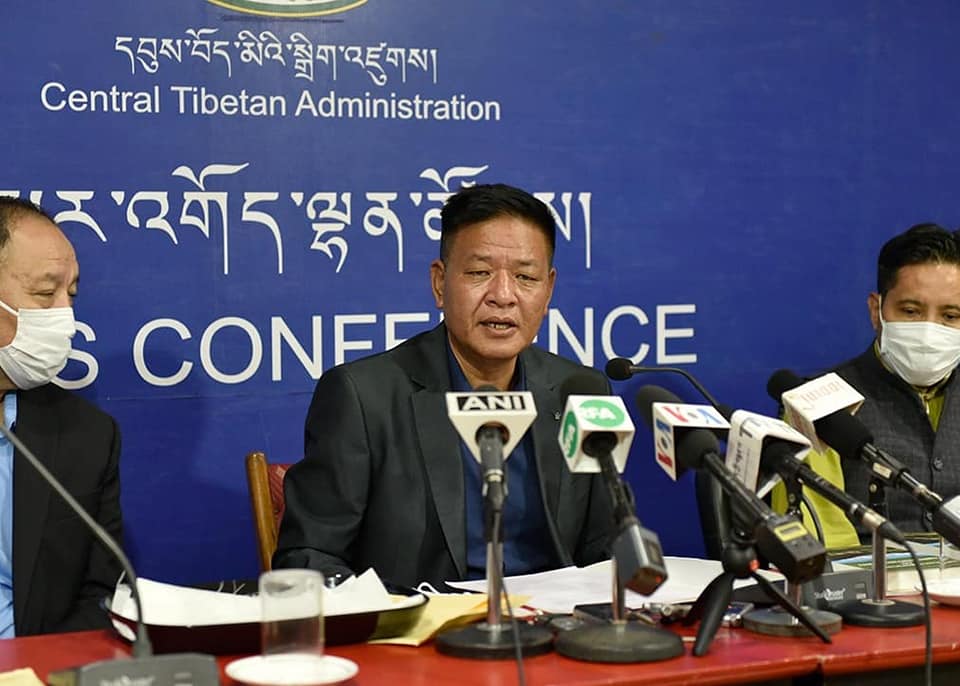By Tenzin Dharpo
DHARAMSHALA, Oct. 21: The remarks made by the President of the Central Tibetan Administration Penpa Tsering on Sunday is in line with a long-held directive of the exile Tibetan government to never cause inconvenience to its host. A tenet that even His Holiness the Dalai Lama and the long line of exile leadership before him have towed religiously over the decades.
During the 60th anniversary of the Men-Tsee-Khang’s re-establishment in exile here on Sunday, President Tsering said, “In the last few days, the situation between India and China along the Indo-Tibet border has escalated considerably. So in order to avoid causing any inconvenience to our host- the Indian government, we have decided to cancel the trip to Arunachal Pradesh”.
Against the backdrop of rising border tensions along the Indo-Tibetan border in Ladakh and Arunachal Pradesh, the move by the President can best be seen as being cautious although inconsistent. In August this year, barely two months after the Galwan valley confrontation in Ladakh, where 20 Indian troops and unspecified number of Chinese soldiers perished, the President indulged in an extensive visit to the region, including the bordering Chang-thang region where he met Tibetan refugees living there. The trip to Ladakh was the first official visit of his presidency.
The Sikyong (President) instead said he will be visiting Tibetan settlements and communities in Kalimpong, Darjeeling, Gangtok in northeast India from 18 – 26 October. His senior official and Secretary of the Information and International Relation wing of the CTA, Karma Choeying speaking to Phayul refuted any ulterior motives other than what was said by the President. When asked if the rhetoric of the cancelled trip may play into China’s assertion of Tawang as a disputed region, he said, “Not at all. As refugees, we must live and operate as per the laws of the land and be mindful of not posing any difficulties to our host.”
The official approach of the exile Tibetan leadership is however in stark contrast to the Indian government’s objection to China’s protest over Vice-President M. Venkaiah Naidu visit to Arunachal Pradesh’s capital Itanagar over the weekend. In response to the Chinese Foreign Ministry asking India to “stop taking actions that would complicate and expand the boundary issue”, the Ministry of External Affairs (MEA) spokesperson Arindam Bagchi said, “Arunachal Pradesh is an integral and inalienable part of India. Objecting to the visit of Indian leaders to a state of India does not stand to reason and understanding of Indian people,” he noted.
The exiled Tibetan leader His Holiness the Dalai Lama visited Tawang on numerous occasions and President Tsering’s predecessor also visited Tawang in 2014 despite repeated Chinese protest.
Also, the historical claims made by China over Arunachal Pradesh are false, says Tsewang Dorji, a research Fellow at CTA’s think tank, The Tibet Policy Institute. “China claims Arunachal Pradesh as an integral part of China, and calls it “South Tibet”. But in fact, the government of Tibet legally ceded Tawang (Monyul) to British India during the Simla Convention of 1914. Therefore, the Chinese claim over Tawang raised after China’s invasion of Tibet in 1950 is invalid. China’s protest against either Indian or Tibetan leader’s visit in Arunachal Pradesh is unwarranted and without claim,” he told Phayul.

The President of the CTA retracting into not causing inconvenience to New Delhi in this manner is perhaps, most unsettling to Tibetan writer and activist Tenzin Tsundue who since the last 65 days have been touring the expanses of the Himalayan belt in India, including the border regions of Tibet to spread awareness of India’s timidity in dealing with China and the self-harming complicity of India in not recognizing Tibet as an occupied nation.
“It’s appalling how a routine Chinese diplomatic censure of Mr. Naidu’s Itanagar trip has caused a political frigidity in South block and our Sikyong had been advised against his Tawang trip. For the welfare of the 10,000 Tibetan refugees scattered across Arunachal Pradesh, Sikyong’s trip is crucial for his newly elected government,” Tsundue told Phayul.
The move by the Sikyong, larger yet, may be in abetment to Indian government’s periodic adjustment of the ‘Tibet card’, Tsundue feels. “This self-censorship aids Chinese efforts in neutralizing India’s claim over Arunachal as “controversial”. This is India’s self goal.
“India’s failure in calling out Xi Jinping’s Nyingchi and Lhasa trip in July proves that India hasn’t come out of the 1962 mentality that India is safe even after Chinese occupation of Tibet, even after the Galwan Valley Massacre”.










